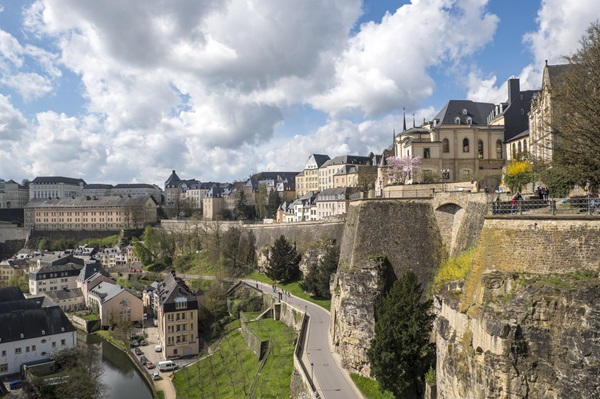 Panorama Corniche;
Credit: Vic Fischbach
Panorama Corniche;
Credit: Vic Fischbach
On Thursday 1 August 2024, Luxembourg’s Ministry of Culture announced that UNESCO's World Heritage Committee met in New Delhi, India, from 21 to 31 July for its 46th annual meeting; Luxembourg's site conservation efforts received unanimous approval.
The meeting aimed to discuss new applications, the possible transcription of certain sites on the list of heritage in danger or the removal of a site from the list.
Of the 29 cultural, natural and mixed sites that were candidates, 23 were inscribed on the World Heritage List, a number much lower than in previous years. Seven of these sites are located in the Europe/North America region, which represents 46.85% of the total inscriptions. With one withdrawal and one addition, the list of world heritage in danger remains stable with 56 properties. No site was delisted during these meetings, the ministry added.
Every six years, the World Heritage Committee reviews the management of "Luxembourg, old quarters and fortifications" based on a periodic report. The recent analysis for the "Europe / North America" region covered 2018-2023 and included 51 states and 547 sites, including Luxembourg's old quarters and fortifications. Out of 56 properties discussed for conservation status, Luxembourg was one of four Western European countries whose 2023 report was approved unanimously without any comments.
"This international assessment confirms that the national legislative and regulatory framework, the general development plan of the City of Luxembourg, the site management system and tourism management have proven their worth in preserving, conserving and transmitting heritage of outstanding universal value to future generations," rejoiced Eric Thill, Luxembourg’s Minister for Culture.
Action Plan for Europe and North America (2024-2031)
The World Heritage Committee has also adopted an Action Plan for Europe and North America (2024-2031), outlining priorities and goals for the implementation of the World Heritage Convention in the region. This plan addresses climate change, sustainable development, social and cultural inclusion, the interconnection of cultural, natural and intangible heritage, capacity building and biodiversity protection. Adopted in New Delhi, the Action Plan aims to strengthen national policies, legal frameworks and governance to ensure the protection of Outstanding Universal Value through effective management of World Heritage sites, the ministry noted.
According to the ministry, the Action Plan should be understood and implemented taking into account the following guiding principles:
- World Heritage properties and their management result from intertwined cultural, social, and ecological dynamics with effective protection requiring a holistic approach that considers both cultural and natural values;
- protecting World Heritage properties necessitates collective action, political will and cooperation among heritage authorities, managers, institutions and other sectors such as education, energy, tourism, transport and agriculture (awareness-raising among civil society is also crucial);
- World Heritage can serve as a catalyst and source of inspiration for broader heritage conservation efforts.








